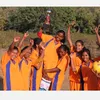From a refugee to FC Tibet captain, the story of Jamyang Chotso
Jamyang Chotso fled Tibet in 2004 as a little girl, and grew up in a Dharamsala refugee camp for Tibetan children. She’s now the Tibetan Women’s Football team captain, which played in the first-ever CONIFA Women’s Football World Cup.
It was 2004, and eight-year-old Jamyang Chotso had just arrived at a refugee camp in Nepal after a 10-day adventurous trudge across international borders. Fleeing Tibet, a confused and torn Jamyang had no clue why her parents had sent her with others like her on this journey, but as she boarded a bus to Delhi from Nepal, and found herself in Dharamsala, it finally dawned on her.
Fast forward eighteen years, Jamyang, now 26, is not only a full-time nurse, but also a central defender and captain of FC Tibet, the host team of the inaugural CONIFA World Cup for women that was held between July 1 and July 6 this year. The Confederation of Independent Football Associations, aka CONIFA, is the governing body for all associations outside FIFA, and in its words, comprises "de-facto nations, minority people, and sports-isolated territories."
“When I reached India, it was so different from my country. I felt lonely, missed my family a lot, and cried almost every day, but I knew I was in safe hands,” recalls Jamyang, who went on to study at a residential school in Gopalpur, Himachal Pradesh.
This is where, on a dusty school playground, minus football boots, 12-year-old Jamyang first kicked a football. She says, sports was a happy escape and helped her forget her day-to-day worries.
From refugee to captain
Jamyang grew up at the Tibetan Children’s Village school in Gopalpur, determined to make something of her life. The school provides day-care, medical treatment, primary and secondary education, as well as family-based care to Tibetan refugee children, who often live alongside their huge network of brothers and sisters.
While sports has been an integral part of Jamyang, learning the Tibetan language and culture also took precedence. “Even though we have left our country, we cannot forget our roots,” she notes.
In the last eighteen years, Jamyang has not once been able to go back to the country where her parents still live. “I miss them, but I talk to them once in a while,” she says, adding that with all the opportunities she has now, she understands why her parents took the drastic step of sending her away.
“In Tibet, we do not get to learn our language or understand the rest of the world. In India, we have our own Tibetan schools. We can learn and preserve our own language,” she says.

Tibet Women's Football team practising for the CONIFA tournament.
On a global stage
Jamyang’s passion for sports, and football specifically, was noticed by many in her community. “I was recruited by Cassie, an American who used to live in Dharamsala in the first-ever Tibet women’s team when I was in school. From there I started playing. She organised many football camps and tournaments for girls,” says Jamyang.
When it was time to choose a captain for the CONIFA Women’s Football team, it was only natural that Jamyang was the lead choice. Former men’s football international player Gompo Dorjee coached the team for the World Cup. “I met coach Gompo in one of the camps Cassie organised in 2016. From then he started coaching us,” says Jamyang.
She feels the World Cup tournaments were a major breakthrough for women's sport in Tibet, and she is thrilled her team inspired other young footballers.
“Not all the girls in our team are professional footballers. As a community, we don’t play enough football, so it was tough to gather a team. Also, as our players are spread across, we only get one or two months to play football as a team. We had to work on our fitness and football skills in just two months,” reveals Jamyang.

The Tibetan Women's FC team overjoyed at being able to represent their country
Earlier this month, the Tibet National Sports Association organised the CONIFA tournament in the beautiful Paonta Sahib, Sirmar district of Himachal Pradesh. While four teams were expected to take part in the tournament initially–Tibet, Sapmi, Matabeleland, and Székely Land–the latter two nations dropped out, leaving Tibet and Sapmi to face each other.
Although Tibet lost to Sapmi, Jamyang is proud of her team members, who include girls as young as 16. “It has always been rare to see girls from our community play football, and finding talent is not easy,” she says, adding she herself grew up playing against her male classmates.
“I'm very proud even if we lost the match. All my teammates are very happy too–we got an opportunity to represent our country,” says Jamyang, who is still unsure whether her parents back in her home country are aware of her achievement.
What next? For now, Jamyang says she’s going to take a well-deserved break, before going back to her day job nursing patients, a role she enjoys as much as the one on the field.
Edited by Megha Reddy








